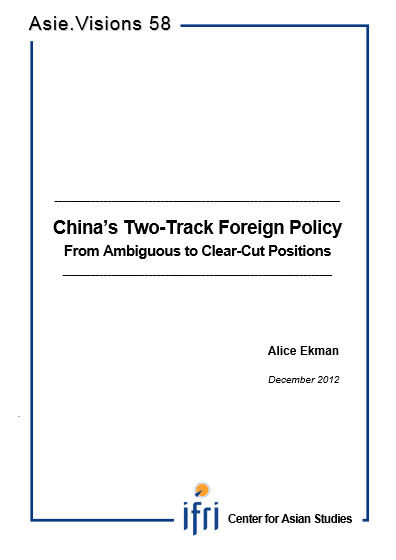China's Two-Track Foreign Policy: From Ambiguous to Clear-Cut Positions

This analysis examines the current ambiguities, priorities and approaches of Chinese foreign policy from a practitioner’s perspective, taking into account experiences of Beijing-based diplomats (interviews conducted in 2011 and 2012), in addition to recent Chinese foreign policy positions and official communications.
It leads to the following conclusions:
- The Chinese position on many foreign policy issues (climate change, nuclear proliferation, etc.) is hard to identify, even by practitioners in regular contact with Chinese diplomacy.
- If ambiguity remains, it is not only because of strategic opacity; on a majority of issues, China has not clearly decided on a position.
- Depending on the issue at stake, China adopts different foreign policy approaches. Two main approaches can be identified: when “core interests” are involved, China has a clear position and may adopt a more proactive foreign policy if needed. For other interests, the Chinese position is often undecided, and remains flexible depending on situational changes. In these cases, China adopts a passive foreign policy approach.
- Rhythm and relationship to time also differs according to this divide: China’s diplomacy tends to be much more anticipative and its decision-making process faster and more streamlined when dealing with “core interests” than with other interests.
- Lately, China’s definition of “core interests” is enlarging (inclusion of South China sea, of economic interests in general terms, etc.). This certainly reflects a reorientation of China’s foreign policy, but not a turning point.
- China’s foreign policy is likely to remain based on these two different approaches in the short and medium run, for several reasons: it is in China’s interest; domestic and international pressures for a more proactive strategy are limited; current foreign policy institutional mechanisms as well as the absence of clear-cut ideological foundations prevent the emergence of a more consistent strategy and; above all, the central government’s top priority remains domestic stability.

Available in:
Regions and themes
ISBN / ISSN
Share
Download the full analysis
This page contains only a summary of our work. If you would like to have access to all the information from our research on the subject, you can download the full version in PDF format.
China's Two-Track Foreign Policy: From Ambiguous to Clear-Cut Positions
Related centers and programs
Discover our other research centers and programsFind out more
Discover all our analyses
RAMSES 2024. A World to Be Remade
For its 42nd edition, RAMSES 2024 identifies three major challenges for 2024.
France and the Philippines should anchor their maritime partnership
With shared interests in promoting international law and sustainable development, France and the Philippines should strengthen their maritime cooperation in the Indo-Pacific. Through bilateral agreements, expanded joint exercises and the exchange of best practices, both nations can enhance maritime domain awareness, counter security threats and develop blue economy initiatives. This deeper collaboration would reinforce stability and environmental stewardship across the region.

The China-led AIIB, a geopolitical tool?
The establishment of the Asian Infrastructure Investment Bank (AIIB) in 2016, on a Chinese initiative, constituted an attempt to bridge the gap in infrastructure financing in Asia. However, it was also perceived in the West as a potential vehicle for China’s geostrategic agendas, fueling the suspicion that the institution might compete rather than align with existing multilateral development banks (MDBs) and impose its own standards.
Jammu and Kashmir in the Aftermath of August 2019
The abrogation of Article 370, which granted special status to the state of Jammu and Kashmir (J&K), has been on the agenda of the Bharatiya Janata Party (BJP) for many decades.







